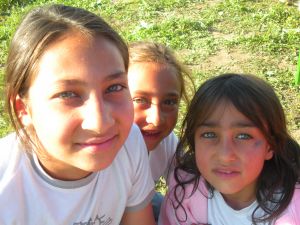By Guest Blogger, Anonymous
Over the weekend, I went to my friend’s daughter’s dance competition. The talk turned to girl drama between her daughter, “Hannah,” and her best friend, “Michaela.” According to Hannah’s mom, the girls are drifting apart. Apparently, Michaela wants to collect as many other friends as possible—the “quantity, not quality” approach. Michaela is starting to ignore Hannah when other, “cooler” girls are around, and Hannah is pretty bummed.
Boy, did that conversation bring back memories. My best friend in elementary school just knew how to be cooler than I did, and by 7th grade, she didn’t want goofy me tagging along. I did not handle the situation well at all. I remember lots of tears, feeling abandoned, and a complete lack of insight about how to make things better or find new friends. My parents were both at a loss; even as they felt my pain, I am sure they wondered how a high school quarterback and a homecoming queen produced this awkward offspring.
I have started trying to imagine what I will say when one of my own children gets rejected by a friend. Despite my experience with this, I did not come up with anything worthwhile. For one thing, you can’t really make a friendship happen. It just has to evolve naturally. Also, most kids’ worlds are small, so unless they are changing schools or moving, they are going to see the same group of people. A “marked kid” (rejected by another kid for all to see), will not have the rest of the gang lining up to be friends. It’s also not always a great time to tell kids to try out for flag football or drill team so they can meet new friends. Although this sometimes works, it can also backfire, since the rejected kid already feels vulnerable and may not want to risk embarrassment at trying something new. And while playing the, “I think you’re great, and if this other person can’t see that, they are crazy,” card may help a kid feel better, it only takes so long before the, “But you’re my parents and you have to say that,” argument kicks in.
There is also the flip side of this coin. My own child told me the other day that a certain friend at school was now “…getting on my nerves! She keeps poking me and touching me to get me to talk to her, and won’t leave me alone!” My advice was that this friend obviously needed some attention, and maybe being extra kind would reassure her and stop the poking. I also said maybe it was time to tell the friend to please stop. But, I am not completely comfortable with this advice. Is asking a young child to be patient with someone who pokes them too much to expect? Nobody likes to be pestered, after all.
So what say you, parents? What do you tell your “tween” when she comes home in tears because she is the only one who didn’t get invited to Emma’s party? How do you comfort your seven-year-old when no one will tag him during recess? And, conversely, what do you say to your kid if you find out she is being unkind to a longtime, loyal buddy? How do you encourage your child to gently “grow apart” from a friend without being hurtful? I would love to hear some advice for teaching kids how to successfully get themselves over these bumps in the road to growing up.
















